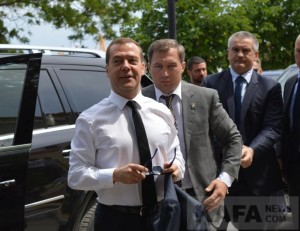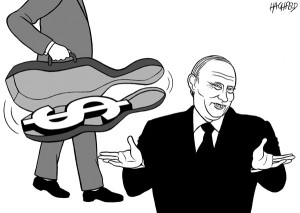
On May 23, during a visit to Crimea, Russian Prime Minister Dmitri Medvedev made a fool of himself with a cynical and provocative phrase that quickly became one of the most popular hits on Russian Internet. Answering the question from an elderly lady about why pensions are not being raised, Medvedev, without so much as a thought, retorted: “There’s simply no money. If we find the money, we will raise pensions. You hold on here, I wish you all the best, good spirits and good health.” But the money is lacking not only for pensioners: all those who had for years depended on the needle of “Putinomics” are experiencing problems.
Russia’s largest car manufacturer, AvtoVAZ, is once again finding itself in a difficult situation: beginning on June 6, its workers were transferred from a four-day to a three-day week; layoffs of between 5,000 and 8,000 people are expected. According to AvtoVAZ’s report, the company’s debt arrears of more than 45 days after the first quarter of 2016 has reached 25.3 billion rubles—3.8 times greater than during the same period of 2015. The company’s total debt to suppliers and contractors during the same period amounted to 66.5 billion rubles (including arrears of 25.3 billion.) After the first quarter of 2016, the company’s net loss has increased 48 times, reaching 8.6 billion rubles. To cover its losses, AvtoVAZ will ask its French partner, Renault-Nissan, for a loan of 20 billion rubles. If it is unable to pay that loan back, AvtoVAZ will have to pay with its shares and assets. Sergei Chemezov, head of the Rostekh corporation that owns the controlling stake in AvtoVAZ, can forget about his “patriotic” plans for the pride of Russia’s auto industry.
Another once-prominent factory, Uralvagonzavod, whose workers promised to crush Moscow’s opposition rallies with tanks, sent 3,000 employees—10 percent of its workforce—on an administrative leave beginning on June 2. The factory’s largest private creditor, Alfa Bank, is openly raising the possibility of its bankruptcy.
Yet if AvtoVAZ and Uralvagonzavod are known throughout the country, other plants are less prominent—but the situation there is no less difficult. Social and workplace conflicts are on the rise because of wage arrears. Putin’s protection is not to be expected. During the president’s televised “direct line,” Dmitri Dudkin, an employee of Uralavtopritsep, complained to him that “there are large arrears, wages are being delayed by three months. Moreover, they don’t pay us in full, they pay in small increments. Wages are small.” After that, Dudkin received a visit from court bailiffs and had to resign from his job “on his own will.” And this is not the worst thing that can happen: a resident of Chechnya who complained to Putin about Ramzan Kadyrov’s corruption had his house burned down.
The budget situation is also difficult. Here is only one of the most recent news stories: state employees in Novokuznetsk wrote a complaint about wage arrears and about wages being cut by two to three times. The people are merely surviving. The most difficult situation is in education and science. Yet it is state employees who form Putin’s principal social base of support.
It is not only mere mortals who face financial difficulties, but Putin’s close confidants as well. Arkady Rotenberg’s Stroigazmontazh company is getting ready to suspend its “project of the century,” the bridge to Crimea, as payments from the federal budget are being delayed. According to Forbes magazine, the company has not received a payment of 65.4 billion rubles because of bureaucratic delays. But this was not a mere formality: the bureaucratic procedure has changed because the government was forced to strengthen control over budget spending, as the funds are simply being stolen.
Even the chekists, the powerbase of Putin’s regime, are having difficulties. Wary of debt problems amongst its employees, the FSB is proposing to tighten the rules on hiring, pointing to financial troubles and debts that many people have. Evidently, they assume that an indebted chekist will be unable to defend the regime from internal and external enemies.

Given this context, it is not surprising that 40 percent of Russia’s top managers are considering emigrating. One of the main consequences of sanctions and the drop in oil prices has been a decrease in business projections. Putin has seized Crimea for Russia, but he has also created conditions in which Russians are gradually losing the very means of survival. This applies to everyone – from those who live from paycheck to paycheck to those who have made fortunes from their close ties to the state. Putin’s policy course is strengthening his public support, but it is also robbing the people and the elites of their prospects: the economy is guzzling away the resources that have been amassed during the years of prosperity, and is, slowly but surely, descending into an investment and structural crisis. “You hold on here, I wish you good spirits,” – this is all the government can say in the current situation.





